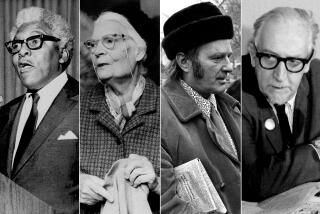Couple Put Their Money on World Peace
- Share via
With Elizabeth, it started emotionally; with Tom, logically.
She was a high school teacher in Bakersfield when her best student--and the school’s best student--was drafted into the Army as soon as he graduated. “Two weeks after he was sent to Vietnam,” she says wistfully, “he was killed. And I thought, what a dreadful waste. There must be a better way.”
Tom was a career Air Force officer, in logistics and planning, assigned to the Rand Corp. after “ducking Russian rockets through the Tet offensive in Vietnam.” And in that high-level think tank it occurred to him that if the same energy and resources were devoted to planning for peace instead of war, it just might work.
That was two decades ago. Last year, Elizabeth and Thomas Tierney put their money and their energies where their hearts were by establishing a $350,000 academic Chair for Peace at UC Irvine, the first in the University of California system and--as far as they know--the first active such appointment in the nation (a similar chair at Yale has never been filled).
It’s been a year now since the gift was accepted by UC’s Board of Regents, and the Tierneys are getting a little anxious, Elizabeth more than Tom.
“Although we receive reports monthly as a courtesy,” he says, “the selection process for the person who will fill the chair is totally in the purview of UCI. We expected that, and we knew the search would be long and tough. A panel of UCI faculty has solicited applicants worldwide, and they have now been reduced to a small pool of candidates. The nature of the chair implies a lifetime academic appointment, and there is no precedent for such a position. That’s one big reason the selection process has been so rigorous.”
Early in the search the Tierneys were asked to help define the parameters of the peace chair. “We asked only,” Elizabeth Tierney says, “that it be filled by a person willing to share his or her research in this community. We want someone who will be visible.”
The irony of the nation’s only academic peace chair being paid for by a former career military officer in one of the most politically conservative areas in the United States is not lost on the Tierneys.
“I think the political climate in Orange County is changing,” Tom Tierney says, “and I have great respect and admiration for UCI. War is a learned behavior. Peace can also be a learned behavior. What better place than a fine academic institution to find out how to do it? I envision peace classes in all of the academic disciplines someday.”
The background of the donors is more complicated than the political climate in Orange County. Stereotypes die hard, and this kind of talk in the magnificent sunken living room of the Tierneys’ palatial, Spanish-style home overlooking Newport’s Back Bay seemed at first out of synch with its surroundings. But the Tierneys are persuasive people. They are also committed.
“I see myself,” Tom says, “as a hawk for peace.”
Both Tierneys were born during World War II. He grew up in Detroit, got a reserve officer’s commission and a degree in logistics management at Wayne State University and volunteered to go to Vietnam. There, he became deputy chief of logistics planning for the 7th Air Force.
How would he have responded then to what he is saying today?
He considers the question for a long time--which is how he considers most subjective questions. Finally, he says: “I would have acknowledged the desirability of the concept but found it difficult to concentrate on while I was diving for cover from Russian rockets.”
Tierney went from Vietnam to the Pentagon, then to the Rand Corp., where he spent three years as an Air Force major working on research for SALT II and SALT III.
“Working with the people who created our defense position, I came to realize that few things are black and white, right or wrong. And from that place, to realize that peace could be a viable option if the same effort were put into it that goes into creating an operational war program.
“But people must be given a safety net, because this is a threatening idea. That’s why being for peace doesn’t mean being for unilateral disarmament or against a strong national defense. Quite the opposite.”
In 1971, when Tom was about to be shipped back to Washington, he resigned from the Air Force because “I couldn’t fly a desk, and the economics weren’t working.” He bought modestly into a Tustin pharmaceutical and vitamin manufacturing firm, applied his logistical management techniques successfully and became owner of the company four years ago when the founder died.
Tierney is a large man, imposing without being intimidating, with a steady gaze and considered speech. Some of his talk sounds more portentous than he intends. He knows that and softens it with humor and self-deprecation. But he holds his views strongly and doesn’t water them down.
Last year, for example, he decided to include a statement in his corporate brochure about the need for global nuclear disarmament. He says he was advised not to do it but did it anyway. Why? He agonizes a little, saying, “How can I answer that without sounding self-serving?” Then he says firmly: “You either take a position or you don’t.”
Elizabeth Tierney’s position began to solidify when she saw her students being killed in Vietnam. A native of Bakersfield, she graduated from Cal Poly San Luis Obispo in English literature and “taught through every level of school in Bakersfield. And it kept impressing me that all our children study history in terms of war; everything is dated pre-war or post-war. It seemed to me there must be a better way to study civilization, that we might teach kids they have other options than bashing one another over the head.”
She had moved to Orange County, won an master’s degree in psychology at Chapman College and was teaching at Saddleback College when she met Tom 10 years ago. They were married a year later. This is a second marriage for both, and they each have two children--Tom has two daughters in college, and Elizabeth, a 16-year-old son and a married daughter.
Elizabeth is a small, trim, warm, attractive woman--difficult to envision as the grandmother she became last year.
Both Tierneys are involved in the Beyond War organization and acknowledge it as a catalyst in their thinking. Both also believe that partisan politics has no place in the quest for peace.
“Beyond War,” Tom Tierney says, “has deliberately avoided the political arena. It was chartered to educate, and it goes out of its way to maintain a neutral political position. Part of its great strength is due to its ability to avoid being put into a political box.”
Two years ago--”this couldn’t have come at any other time in our lives”--the Tierneys decided they wanted “to leave a legacy of peace. Then,” he says, “we asked ourselves how we could best do this, and our educational institutions seemed the most effective way. But it had to be a university, because the clock is ticking too fast. We need to get it to the people who are going to be the movers and shakers in this country as soon as possible.”
So the peace chair was born. “As we create new ground in this area,” he says, “we know the new ideas will come. When people plan for the future, they have to be able to plan for peace.”
More to Read
Sign up for Essential California
The most important California stories and recommendations in your inbox every morning.
You may occasionally receive promotional content from the Los Angeles Times.













